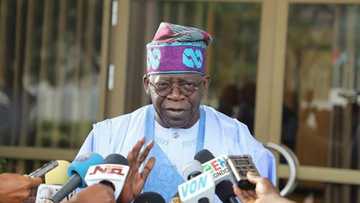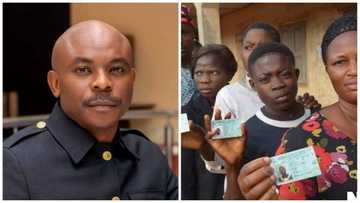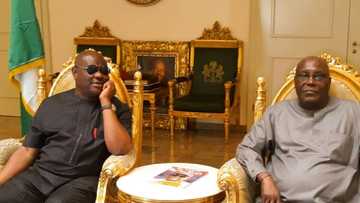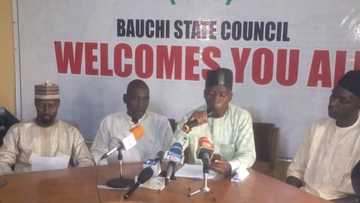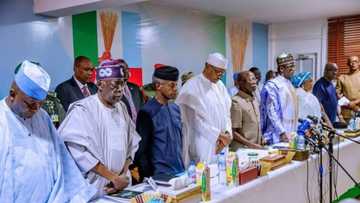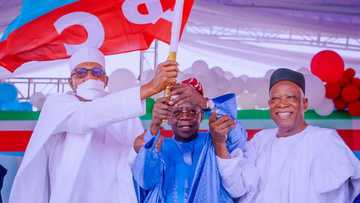Ex-Service Chiefs and Trend in Partisanship by Stanley Ebube
Editor's note: Public affairs analyst, Stanley Ebube, writes on the open partisanship of former military chiefs in the recent political activities of the APC, arguing that the standard is for highly decorated military and intelligence retirees to support the civic and political process by offering advisory and consultancy roles in think thanks, public institutions, and civil society.
PAY ATTENTION: Click “See First” under the “Following” tab to see Legit.ng News on your Facebook News Feed!
Nigeria is in an election season and, as expected, politicians and political interests are aligning and realigning for individual and collective best interests. As Nigerians look forward to electing or reelecting legislators and governors, much of the excitement and frenzy is about who occupies Aso Rock, the nation’s seat of power, come May 29, 2023.
Already, the two major political parties – the ruling All Progressives Congress (APC) and the main opposition Peoples Democratic Party (PDP) have conducted their party primaries. While former Vice President Atiku Abubakar emerged as PDP’s presidential flag bearer, former Lagos state governor, Bola Tinubu, emerged as APC’s standard-bearer.
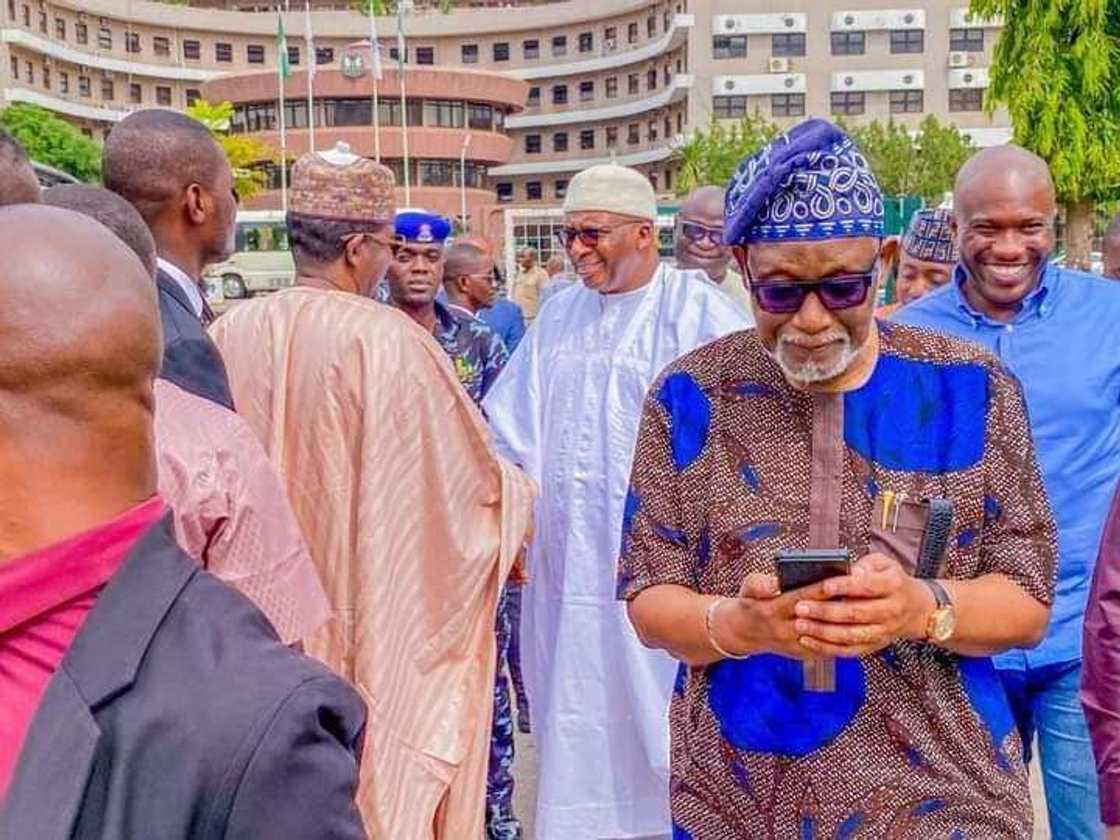
Source: Twitter
Of course, there are other presidential candidates who could spring a surprise as outliers (such as Peter Obi of the Labour Party and Rabiu Kwankwaso of the New Nigeria Peoples Party), but the reality on ground strongly suggests that Nigeria’s next president is going to emerge from either of the two major parties.
It is therefore understandable, if not permissible, to find strong politicians and other public figures in the company of Atiku and Tinubu as electioneering thickens.
PAY ATTENTION: Share your outstanding story with our editors! Please reach us through info@corp.legit.ng!
However, a potentially dangerous trend has reared its head in Nigeria’s political process and, but for a few mentions, has managed to escape the radar of our national discourse. While it is the inalienable right and freedom of former service chiefs and top security and intelligence personnel to associate politically, it is standard practice and ethical responsibility for such personalities to publicly function within certain codes which guide their post-retirement conducts.
Post service, the standard is for highly decorated military and intelligence retirees to support the civic and political process by offering advisory and consultancy roles in think thanks, public institutions, and civil society.
The excessively partisan endeavours of former service chiefs and retired top security personnel became visible prior to the 2015 general election. Yet, in the wake of the just-concluded party primaries, the unfortunate occurrence has taken a worrisome dimension. Or what else explains why a former Chief of Army Staff (COAS) takes such a politically exposing role as an agent to an aspirant seeking political office? Another former military high-ranking officer, one who attained the same high level in the military, served on the convention security sub-committee as co-chair.
Of course, this piece is referring to the conduct of Lt.-Gen. Abdulrahman Dambazau and Lt.-Gen. Tukur Buratai before and during the APC special convention, from where the party’s presidential candidate emerged.
While Dambazau served as COAS between 2008 and 2010, Buratai held the same position from 2015 to 2021.
Before the primary election, Buratai was in the news openly soliciting delegates’ votes for former transport minister Chibuike Rotimi Amaechi. On his part, Dambazau was appointed co-chair, alongside Governor Rotimi Akeredolu of Ondo state, on the security and compliance sub-committee of the APC convention. He was notably visible in his reflective jacket carrying out tasks many in the high-ranking officials in the defence and security circle believe are incongruous with his standing as former army chief.
For a fact, both Dambazau and Buratai have committed no known crime by their partisanship and hobnobbing with ‘career’ politicians. However, we should heed the words of the late Maj-Gen. Alexander Madiebo (rtd.), who said in his book:
“No matter what a politician does, he must always avoid drawing his country’s army into politics. In the final analysis, it cuts both ways, and the results could be contrary to all his expectations.”
As Jim Golby mentioned in his Foreign Policy article of June 2020:
“The military stellar reputation gave its leaders political power. Step by step, these military celebrities took on an active role in politics. It became common for presidential candidates to try to bolster their national security credentials by seeking high-profile endorsements from retired generals.”
However, he sounded a warning note:
“An institution with a tradition of nonpartisanship…makes coalitions between politicians and military leaders more likely and more dangerous.”
Whether it is demanded of them statutorily or not, the public comments, conduct, and association of former high-ranking military officers, such as TY Danjuma, Martin Luther Agwai, etc, continue to pull almost the full weight of their former positions because they have avoided overindulgence in partisanship.
In 2019, the Minister of Defence, Mansur Dan-Ali, received the final submission of the reviewed Armed Forces ACT CAP A20 Laws of the Federal Republic of Nigeria. He said then that a committee was set up to:
“critically examine the Armed Forces Act of Nigeria, collate views from relevant stakeholders, and come up with a reviewed ACT that would be comparable to those of other developed democracies.
“The review of the ACT should be in conformity with constitutional democratic principles, global best practices, and standards.”
The chairperson of the review committee also said the amendment was a “ground-breaking effort geared towards bringing the Armed Forces ACT up to date.”
In keeping with the promise, one wonders whether the draft amendment should include sections which subject retired military officers to certain codes of ethics, as obtained for example in the US, where retired military officers are subject to the Uniform Code of Military Justice (UCMJ).
Article 2 of the UCMJ extends the jurisdiction of military law to retired members of a regular component of the armed forces. The US army implementation regulation specifically states that:
“Retirees are subject to the UCMJ and may be tried by court-martial for violations (that occurred) while in a retired status.”
A similar provision in the Nigerian Armed Forces Act will go a long way in deterring retired military officers from overly getting involved in political leanings.
Whether or not the laws are clear about the conduct of retired military officers, the precedent in a modern democratic setting is for prominent retired officers to be kept out of partisan politics and elections, because no nation wants to drag the military deeper into domestic political issues than necessary.
Nobody should deny retired military officers freedom of expression and association but what they say and who they associate with go a long way in either reinforcing appropriate behavour in the military or putting the institution at risk of setting an unwanted precedent that could have far-reaching implications in the future.
Former military, defence, and intelligence chiefs have the right to partake in the national discourse and become politicians after their illustrious careers if they so wish. But they should be guided and guarded by certain ethical standards; else their character and intent might be questioned.
Disclaimer: The views and opinions expressed here are those of the author and do not necessarily reflect the official policy or position of Legit.ng.
Your own opinion articles are welcome at info@corp.legit.ng— drop an email telling us what you want to write about and why. More details in Legit.ng’s step-by-step guide for guest contributors.
Contact us if you have any feedback, suggestions, complaints, or compliments.
Source: Legit.ng


